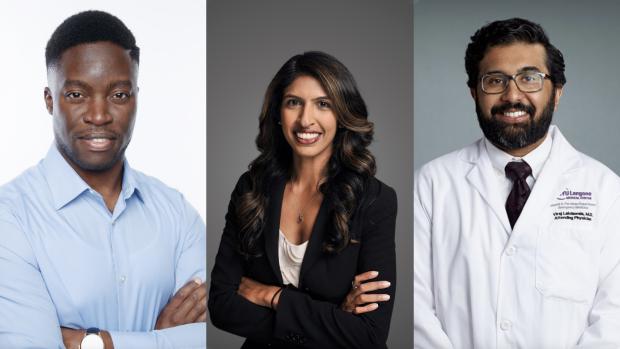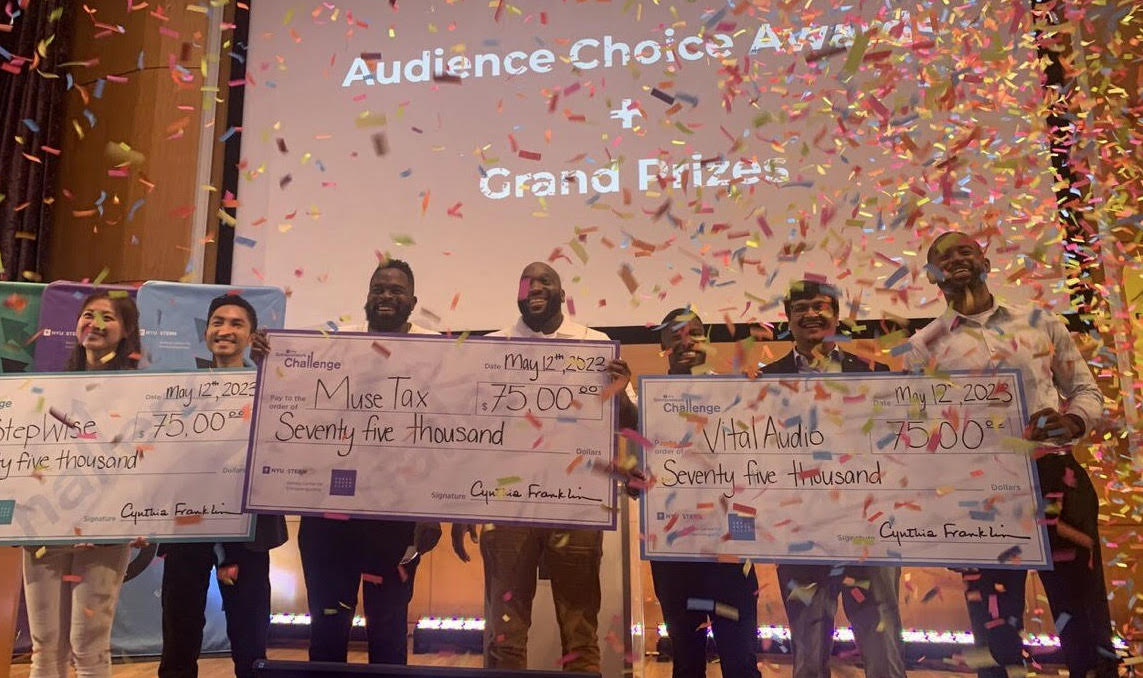Tandon students building tomorrow’s healthcare — today
The A/X Venture Studio at NYU Tandon’s Future Labs helps students become CEOs even before graduating

UPDATE: May 16, 2023
 After competing against more than 100 teams over the past eight months, Vital Audio's voice-based remote monitoring technology emerged as the winner of the Healthcare & Biomedical Venture track at the Berkley Entrepreneurship Challenge, organized by NYU Stern School of Business and W.R. Berkley Innovation Labs, garnering them $75,000 in seed funding.
After competing against more than 100 teams over the past eight months, Vital Audio's voice-based remote monitoring technology emerged as the winner of the Healthcare & Biomedical Venture track at the Berkley Entrepreneurship Challenge, organized by NYU Stern School of Business and W.R. Berkley Innovation Labs, garnering them $75,000 in seed funding.
Imagine being a student and preparing for tests while dealing with clinical trials and FDA submissions at the same time. That’s the challenging but gratifying situation for the aspiring business founders taking part in the A/X Venture Studio, a program run under the auspices of NYU Tandon’s Future Labs that seeks to help students develop and launch viable tech businesses in the healthcare sector.
“Because NYU is fortunate to have top-tier engineering and clinical collaborators within the same organization, we can rapidly identify the needs of clinicians and match them to tailor-made solutions created by Tandon engineers,” explains Vadim Gordin, who directs the Venture Studio in addition to coordinating Tandon’s entrepreneurship competitions. “The beautiful thing is that the process works both ways: Clinicians come to Tandon seeking technical talent to create solutions for their perceived problems as often as graduate engineers come to the Venture Studio for help identifying important clinical problems to solve. Once those connections are made, our teams have a strong advantage relative to independent startups that allows them to iterate and validate their technology and business cases with blistering speed.”
Among the program’s most promising recent successes has been Vital Audio, a team comprised of founder and CEO Nyamitse-Calvin Mahinda, a former first responder and current master’s student in Tandon’s Department of Biomedical Engineering; co-founder and CTO Harsh Sonthalia, who has a deep interest in artificial intelligence and machine learning and is currently pursuing his master’s in Computer Science; and COO Divya Mehta, who is earning an MBA at NYU Stern and who brings to the project almost a decade of experience as an industrial engineer focused on supply chain and operations at such major companies as Johnson & Johnson, Colgate-Palmolive, and Intel.
Vital Audio’s software platform provides asynchronous cardiac monitoring and patient screening over ordinary phone lines, with no special software, wearables or other devices needed by the patient. That enables healthcare systems to automatically direct patients to the most appropriate care, reducing unnecessary hospital admissions and freeing up physicians to attend to those with more acute conditions.
As an example of what’s possible given NYU’s range of resources, the Vital Audio team has moved from a concept on a whiteboard to a working system with its first FDA submission in place, a clinical pilot with the Langone Department of Pediatric Cardiology, and several commitments for follow-on pilots with other healthcare networks, all in under 12 months.
With the help of Farokh Atashzar (a Tandon Assistant Professor of Electrical and Computer Engineering, as well as Mechanical and Aerospace Engineering) and Tae Hong Park (an Associate Professor of Music Technology at NYU Steinhardtt), the Vital Audio team has developed a way to measure vital signs for heart rate and heart rate variability over a conventional phone call, video call, or bluetooth device by capturing audio signals. (The patient is asked to vocalize an extended vowel sound.)
“There is significant promise to various home health monitoring devices and mobile applications, but the majority of avenues established for these services require patients to have additional devices or install special software,” Mahinda says. “My experience and that of many providers that we interviewed is that the technical challenge of asking patients to use a device or install an app is often insurmountable in real-life clinical workflows. This is particularly true for those patients with socioeconomic difficulties or older people uncomfortable with technology. On the clinical side, current market solutions also require additional staff, hardware, and cost, and there’s really no seamless way for a primary care physician or cardiologist to get the objective data they need to assess the severity of a situation remotely.”
Vital Audio, by contrast, leverages existing devices like phones or tablets to provide a simplified and automated solution by providing access to objective data in real-time, with an accuracy rate of over 92%. The team credits Gordin for his support from the earliest days of the project–from customer discovery to a clinical pilot with pediatric cardiologists at NYU Langone to the company’s acceptance into the National Science Foundation’s I-Corps program and the Leslie Elabs competitive Tech Venture Accelerator program, which have collectively allocated $100,000 to support development and validation of the Vital Audio platform. “We ultimately want to make sure patients and providers are heard by bringing voice-based technology,” Mahinda explains.
Additional clinical partnerships are in the works, including collaborations with NYU Langone’s Emergency Department Call Center and Virtual Urgent Care, and they’ve demonstrated the platform at urgent care centers run by the companies GoHealth and ZipCare. The trio is particularly excited to be in the process of submitting their proposal for FDA approval–an enormous milestone for such a young company.
“Considering that industry experts estimate that almost one-third of all emergency department admissions could be eliminated with better, easier access to remote physiological monitoring and that patients spend anywhere from $250 to $1,500 per emergency room encounter, Vital Audio is poised to make a meaningful impact,” Mahinda says. “We are creating value for patients, providers, health systems, and insurance firms by promoting health equity.”
Peer-ing into the future of mental-health support
Megan Fricke knows firsthand just how hard it can be to access the support and resources you need for optimal mental and emotional well-being, particularly as a college student adjusting to a whole new stage of life in a whole new environment.
While studying clinical neuroscience at Virginia Tech as an undergraduate, she had been diagnosed with ADHD, and she found the demands of Tandon’s master’s program in biomedical engineering exceptionally challenging. “It was tempting to simply drop out,” she recalls, “but after seeing a presentation from the Venture Studio, I realized there might be a way to develop a platform that would allow me and other students isolated by thoughts and stressful events to form a community, remain in school, and succeed.”
Academic support offices typically lack the resources to adequately aid students stuck in a liminal space in a timely way, Fricke — who admires the data-driven work of British psychologist Adrian Wells, an expert in metacognitive theory and therapy — explains. To mitigate that situation, which is prevalent across the nation, she created Peeramid, an educational platform to connect students across universities that provides self-help tools, peer support, and science-backed interventions.
Just six months after she and CAS computer science major Vivi Wei began working on the idea, Fricke was admitted into the NYU Female Founders Circle, planned a pilot with NYU’s Office of Student Success, and booked her first revenue stream, thanks to a five-year contract with Langone. Her mobile app is officially launching soon, and students can signup for the waitlist at join.peeramid.app.
The platform, which is HIPAA-compliant, employs asynchronous audio and video. “Everyone wants to be seen and heard,” Fricke asserts, “and to be in a safe environment.”




